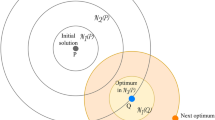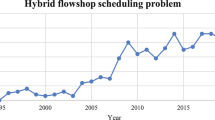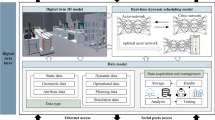A hybrid flow shop (HFS) is a generalized flow shop with multiple machines in some stages. HFS is fairly common in flexible manufacturing and in process industry. Because manufacturing systems often operate in a stochastic and dynamic environment, dynamic hybrid flow shop scheduling is frequently encountered in practice. This paper proposes a neural network model and algorithm to solve the dynamic hybrid flow shop scheduling problem. In order to obtain training examples for the neural network, we first study, through simulation, the performance of some dispatching rules that have demonstrated effectiveness in the previous related research. The results are then transformed into training examples. The training process is optimized by the delta-bar-delta (DBD) method that can speed up training convergence. The most commonly used dispatching rules are used as benchmarks. Simulation results show that the performance of the neural network approach is much better than that of the traditional dispatching rules.
Similar content being viewed by others
Explore related subjects
Discover the latest articles and news from researchers in related subjects, suggested using machine learning.References
J. H. Blackstone SuffixJr. D. T. Philiphs G. L. Hogg (1982) ArticleTitleA state-of-the-art survey of dispatching rules for manufacturing job shop operations International Journal of Production Research 20 27–45
S. A. Brah J. L. Hunsucker (1991) ArticleTitleBranch and bound algorithm for the flow shop with multiple processors European Journal of Operational Research 51 88–99
H. Cho R. A. Wysk (1993) ArticleTitleA robust adaptive scheduler for an intelligent workstation controller International Journal of Production Research 31 IssueID4 771–789
J. N. D. Gupta (1988) ArticleTitleTwo-stage hybrid flowshop scheduling problem Journal of Operational Research Society 34 IssueID4 359–364
A. Jones L. Rabelo Y. Yih (1995) ArticleTitleA hybrid approach for real-time sequencing and scheduling International Journal of Computer Integrated Manufacturing 8 IssueID2 145–154
C. Y. Lee G. L. Vairaktarakis (1994) ArticleTitleMinimizing makespan in hybrid flowshops Operational Research Letters 16 149–158
H. J. Liu J. Dong (1996) ArticleTitleDispatching rules selection using artificial neural networks for dynamic planning and scheduling Journal of Intelligent Manufacturing 7 243–250
S. S. Panwalkar W. Iskander (1977) ArticleTitleA survey of scheduling Operations Research 25 45–61
Y. B. Park (1988) ArticleTitleAn evaluation of static flowshop scheduling heuristics in dynamic flowshop model via a computer simulation Computers & Industrial Engineering 14 103–112
H. Pierreval (1992) ArticleTitleExpert system for selecting priority rules in flexible manufacturing systems Expert Systems with Applications 5 51–57
R. Ramasesh (1990) ArticleTitleDynamic job shop scheduling: a survey of simulation results Omega 18 43–57
S.K. Sim K.T. Yeo W.H. Lee (1994) ArticleTitleAn expert neural network system for dynamic job shop scheduling International Journal of Production Research 32 IssueID8 1759–1773
Author information
Authors and Affiliations
Corresponding author
Rights and permissions
About this article
Cite this article
Tang, L., Liu, W. & Liu, J. A neural network model and algorithm for the hybrid flow shop scheduling problem in a dynamic environment. J Intell Manuf 16, 361–370 (2005). https://doi.org/10.1007/s10845-005-7029-0
Issue Date:
DOI: https://doi.org/10.1007/s10845-005-7029-0




